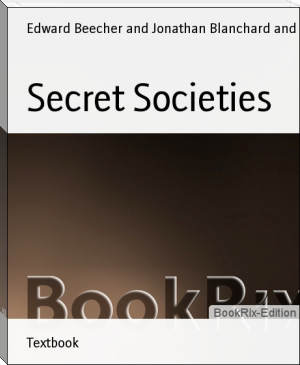Secret Societies by Edward Beecher and Jonathan Blanchard and David MacDill (color ebook reader TXT) 📕

Read free book «Secret Societies by Edward Beecher and Jonathan Blanchard and David MacDill (color ebook reader TXT) 📕» - read online or download for free at americanlibrarybooks.com
Read book online «Secret Societies by Edward Beecher and Jonathan Blanchard and David MacDill (color ebook reader TXT) 📕». Author - Edward Beecher and Jonathan Blanchard and David MacDill
CONTENTS.
I. A TREATISE BY REV. D. MACDILL.
CHAPTER I. THEIR ANTIQUITY.
CHAPTER II. THEIR SECRECY.
CHAPTER III. OATHS AND PROMISES.
CHAPTER IV. PROFANENESS.
CHAPTER V. THEIR EXCLUSIVENESS.
CHAPTER VI. FALSE CLAIMS.
II. SHALL CHRISTIANS JOIN SECRET SOCIETIES?
BY JONATHAN BLANCHARD, D. D.
III. REPORT TO CONGREGATIONAL ASSOCIATION OF ILLINOIS.
BY EDWARD BEECHER, D. D.
CHAPTER I.
THEIR ANTIQUITY.
1. Secret associations are of very ancient origin. They existed among the ancient Egyptians, Hindoos, Grecians, Romans, and probably among nearly all the pagan nations of antiquity. This fact, however is neither proof of their utility nor of their harmlessness. Slavery, despotism, cruelty, drunken falsehood, and all sorts of sins and crimes have been practiced from time immemorial, but are none the less to be reprobated on that account.
2. The facts that these associations had no existence among the Israelites, who, alone of all the ancient nations, enjoyed the light of Divine revelation, and that they originated and flourished among the heathen, who were vain in their imaginations; whose foolish heart was darkened, and whom God gave up to uncleanness through the lusts of their own hearts (Rom. i: 21-24), is a presumptive proof that their nature and tendency are evil. We do not claim that all the institutions among God's ancient people were right and good; nor that every institution among the heathen was sinful and injurious; still, that which was so popular among those whom the Bible declares to have been filled with all unrighteousness; that which was so pleasing to men whom God had given over to a reprobate mind and to vile affections (Rom. i: 26-28); that which made a part of the worship which the ignorant heathen offered up to their unclean gods, and which was unknown among God's chosen people, is certainly a thing to be viewed with suspicion. A thing of so bad origin and so bad accompaniments we should be very slow to approve. The fact that many good men see no evil in secret societies, and that many good men have been and are members of them, is more than counterbalanced by the fact that many good men very decidedly disapprove of them, and that, from time immemorial, men of vile affections and reprobate minds, men whose inclinations and consciences were perverted by heathenish ignorance and error, and by a corrupt and abominable religion, have been very fond of them.
3. Doubtless the authors and conductors of the ancient mysteries made high pretensions, just as do the modern advocates of secret societies. Perhaps the original design of the ancient mysteries was to civilize mankind and promote religion; that is, pagan superstition. But whatever may have been the design of the authors of them, it is certain that they became schools of superstition and vice. Their pernicious character and influence were so manifest that the ancient Christian writers almost universally exclaimed against them. (Leland's Chr. Rev., p. 223.) Bishop Warburton, who, in his "Divine Legation," maintains that the ancient mysteries were originally pure, declares that they "became abominably abused, and that in Cicero's time the terms mysteries and abominations were almost synonymous." The cause of their corruption, this eminent writer declares to be the secrecy with which they were performed. He says: "We can assign no surer cause of the horrid abuses and corruptions of the mysteries than the
season in which they were represented, and the profound silence in which they were buried. Night gave opportunity to wicked men to attempt evil actions, and the secrecy encouragement to repeat them." (Leland's Chr. Rev., p. 194.) It seems to have been of these ancient secret associations that the inspired Apostle said, " It is a shame even to speak of those things which are done in secret ." (Eph. v: 12.)
4. In view of these facts, the antiquity of secret societies is no argument in their favor; yet it is no uncommon thing to find their members tracing their origin back to the heathenish mysteries of the ancient Egyptians, Hindoos, or Grecians. (See Webb's Freemason's Monitor, p. 39.) Since the ancient mysteries were so impure and abominable, those who boast of their affinity with them must be classed with them of whom the Apostle says, " Their glory is in their shame " (Phil, iii: 19.)
CHAPTER II.
THEIR SECRECY.
1. One of the objectionable features of all the associations of which we are writing is their secrecy. We do not say that secrecy is what is called an evil or sin in itself . Secrecy may sometimes be right and even necessary. There are family secrets and secrets of State. Sometimes legislatures and church courts hold secret sessions. It is admitted that secrecy in such cases may be right; but this does not prove that secrecy is always right. The cases above-mentioned are exceptional in their character. For instance, a family may very properly keep some things secret; but were a family to act on the principle of secrecy, they would justly be condemned, and would arouse suspicions in the minds of all who know them. Were a family to endeavor to conceal every thing that is said and done by the fireside; were they to invent signs, and grips, and passwords for the purpose of concealment; were they to admit no one under their roof without exacting a solemn oath or promise that nothing seen or heard shall be made known, every one would say there is something wrong. So, too, if a church court would always sit in secret; were none but members at any time admitted; were all the members bound by solemn promises or oaths to keep the proceedings secret, and were they to employ signs, grips, and passwords, and to hold up horrid threats, in order to secure concealment, such a church court would lose the confidence of all men whose esteem is of any value. Such studious and habitual concealment would damage the reputation of any family or church court in the estimation of all sensible people. The same result would follow in case a Legislature would endeavor, as a general thing, to conceal its proceedings. As to State secrets, they generally pertain to what is called diplomacy; and even in straightforward, manly diplomacy there is generally no effort at concealment. In our own country, Congress very often asks the President for information in regard to the negotiations and correspondence of the Executive Department with foreign governments, and almost always the whole correspondence asked for is laid before Congress and published to the country. It is very seldom that the President answers the call with a declaration that the public welfare requires the correspondence to be kept secret. Besides this, the concealment is only temporary. It is never supposed that the secrecy must be perpetual. It is true that many diplomatists-perhaps nearly all the diplomatists of Europe-do endeavor to cover up their doings from the light of day. It is also true that the secrecy and deceit of diplomatists have made diplomacy a corrupt thing. Diplomacy is regarded by many as but another name for duplicity. Talleyrand, the prince of diplomatists, said "the design of language is to conceal one's thoughts." This terse sentence gives a correct idea of the practice of secret negotiators. With regard, then, to State secrets, we remark that real statesmen do not endeavor to cover up their doings in the dark, and that the practices of diplomatists, and the reputation they have for duplicity, are not such as should encourage individuals or associations to endeavor to conceal their proceedings. We see nothing in the fact that there may be secrets of State to justify studied and habitual secrecy either in individuals or associations.
2. The impropriety of habitual concealment may be further illustrated. An individual who endeavors to conceal the business in which he is engaged, or the place and mode of carrying it on, exposes himself to the suspicion of his fellow-men. People lose confidence in him. They feel that he is not a safe man. They at once suspect that there is something wrong. They do not ask or expect him to make all his business affairs public. They are willing that he should say nothing about many of his business operations. But habitual secrecy, constant concealment, unwillingness to tell either friend or foe what business he follows, or to speak of his business operations, will cause any man to be regarded as destitute of common honesty. This fact shows that, in the common judgment of men, constant concealment is suspicious and wrong. Wherever it is practiced, men expect the development of some unworthy purpose.
We regard secrecy just like homicide and other actions that in general are very criminal. To take human life, as a general thing, is a very great crime; but it is right to kill a man in self-defense, and to take the life of a murderer as a punishment for his crime. The habitual concealment of one's actions is wrong, but it may be right at particular times and for special reasons. It is not a dreadfully wicked thing, like the causeless taking of human life, and may be justifiable much oftener and for less weighty reasons. Still habitual secrecy, or secrecy, except at particular times and for special reasons, is, according to the common judgment of men, suspicious and unjustifiable. Now, with secret societies secrecy is the general rule. They practice constant concealment. At all times and on all occasions must the members keep their proceedings secret. If an individual would thus studiously endeavor to conceal his actions; were he to throw the veil of secrecy over his business operations, refusing to speak to any of his fellow-men concerning them, he would justly expose himself to suspicion. His fellow-men would lose all confidence in his integrity. If habitual secrecy on the part of an individual, in regard to business matters, is confessedly suspicious and wrong, it must be so, also, on the part of associations of men. There is less excuse, indeed, for concealment on the part of a number of men banded together than on the part of an individual. An individual working in the dark may do much mischief, but an association thus working can do much more. All those considerations which forbid individuals to shroud their actions in secrecy and darkness, and require them to be open, frank, and straightforward in their course, apply with equal or greater force to associations.
3. In the case of secret societies, the reasons for concealment set the impropriety of it in a still stronger light. So far from there being any necessity or special reason to justify habitual secrecy in their case, we believe the very design of their secrecy to be improper and sinful. We present the following quotation from a book of high authority among those for whose benefit it was specially intended:
"If the secrets of Masonry are replete with such advantages to mankind, it may be asked, Why are





Comments (0)